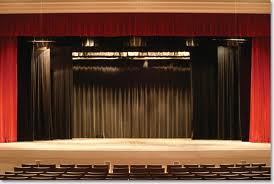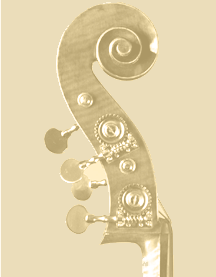Auditioning on Upright Bass (for a
professional orchestra)
We often get young high school or college bound upright bass
students that would like to study music in college with the hope of
getting a position in a professional orchestra. Often, there
is no concept or understanding of how the 'real world' in
professional orchestras work, so here, we would like to give a
general description of how the professional orchestras select bass
players. How to prepare, what kinds of solos and excerpts one
can be asked to play and some general information of how bass
auditions work.
There is a lot going on behind the scenes of preparing for,
taking auditions and the whole process. It can be a pretty
emotionally and financially exhausting process.
How do bass auditions work? First, you can usually
find out about current or future job openings from various trade
papers. In the USA and Canada, the primary source is the
International Musician (which is the monthly newspaper
sent to all AFM (Music union) members. No need to join the
union yet, just ask someone else that is in it to borrow their copy.
In the back of each issue most all orchestras in the USA and Canada
will announce the vacant position, when the audition will take
place, and when the job will start. Sometimes it is immediate,
but often positions are advertised and auditioned for a vacancy that
will happen in the following season.
You can usually email the personnel manager, attaching your
resume and hope that you get an invitation and a repertoire list as
soon as possible. A lot of orchestras now post their
repertoire lists online for interested players to copy down and some
even attach music. (Often the music is with either their bowings,
dynamics or something that is hard to get (like Lutoslowski's
Concerto for Orchestra!)
In most professional symphony auditions there is a lot of overlap
shared with other repertoire lists from other orchestras. For a bass audition, there
are some excerpts that you will almost always have to play. (I
list them here with the most common asked at the top:)
- Beethoven Symphony 5 (both the Scherzo and Trio)
- Beethoven #9 (Recitative and the immediate Ode to Joy
theme...the whole page!)
- Some kind of Mozart: Symphony #39, 40, 35 or 41. (With
most orchestras leaning towards either #40 or 35. (In these
symphonies usually the 1st and 4th movements) , but you should
always be familiar with some of the slow movements too.
Nothing will make you more crazy then to practice all of the
'hard' parts for 4-6 weeks beforehand only to get tripped up on
some slower, easy passage that you just didn't think would be
asked for! So, look at and play everything.
- Usually a Brahms Symphony (I or II). Usually it is
Brahms Symphony #2 (every movement)
- Strauss, Don Juan or Ein Heldenleben. Usually it is
Heldenleben. This is quite the excerpt that can quickly
separate the wannabes from the serious players.
(Excerpt #9, #77, etc...)
There are many, many more pieces that will show up at bass
auditions, but the above list is almost always asked in some way,
shape or form.
Solos asked:
Orchestra audition committees vary in what kinds of solos they
will ask for on an upright bass audition. Some orchestras will
simply require a "solo of your choice". Which generally means,
something that is technical with some measure of difficulty and
expressive, which will show some musicality. Typically, it is
some kind of concerto movement. (Kousevitzky, Bottesini,
Vanhal) or even a movement from a Bach Cello suite.
Some orchestras will require a particular concerto, but this is
more common throughout Europe. Additionally, more and more
orchestras are asking bass players at some point to play either a
movement from a Bach suite (in addition to the solo of their
choice...so now 2 solos are required) OR they require all candidates
to play the Bouree' I and II from the 3rd Cello Suite (played in G
Major). This movement is so commonly asked that you should
memorize it and have it engrained in your playing so well that it
will become easy to play without having to work up each time there
is an audition.
Again, there will be lots of common excerpts that most orchestra
audition committees will ask. Having the most common ones so
well prepared and virtually memorized (along with the common
solos), will free up more time to practice the other lesser
known excerpts that you are not familiar with.
The Audition process. Depending on the time of year,
the quality of orchestra position or even the location, there can be
upwards of 20-100 players showing up for ONE job. Years ago,
at a top level orchestra, I can recall that there were actually 4
days of preliminary rounds, 2 days of semi final rounds and one day
of finals when almost 100 bass players showed up to play, and in the
end... the orchestra committee could not decide on a winning
player!! This sort of thing to me, is just mindless
(childlike) behavior. Really??
When you are invited from the orchestra, they will give you a
date and usually an approximate time block that you will be playing
in. It's often customary for them to ask candidates to pay a
refundable deposit of $100. This way, if you do not show up
(without cancelling in advance) they keep your money. That's
fair if you can imagine that there were always people interested in
getting the repertoire list, but didn't come, would poke holes all
through out the day (of no shows.) This keeps everyone
'honest'.
Most all auditions are behind a screen in at least the
preliminary rounds. This is to keep the process as fair as
possible without any kinds of favoritism or prejudices. Lots
of stage floors are carpeted leading up to the screen so that the
committee cannot even hear the 'candidates' walking noise. At
this point, you are given a number and introduced as such.
"This is candidate #34 and the solo is the Vanhal Concerto 1st
movement." You get to play your solo for about 2-4 minutes
before being cutoff (usually the case) and then there will be a list
of what excerpts you play. (Personal note from Steve:
Some of the silliest things can make people the most nervous.
For me, I used to go crazy wondering or worrying about which
excerpts they would ask and the sequence. Sometimes you can
get asked kind of a "stupid" excerpt at the very beginning and the
surprise can get the better of your nerves. What I did
to counteract that was to put all my excerpts in a "hat" and then
pull them out as they came by chance. This way I practiced various sequences or
orders so that when I actually did the live audition, it was then
nothing new or too upsetting. Usually, the solo is what you
have practiced the most on and it is usually a nice way to start
with the solo and get 'settled' for the rest to follow. There
are usually around 4 excerpts or so that the committee will want to
hear. The committee will then vote after each player is
finished. While it depends on the orchestra, it is usually
some formula requiring a certain majority. For instance, 4 out of 7
votes for YES or 6 out of 8. Something like that.
Usually there are prelims, then finals. With large numbers
of players coming to the audition, semi-finals are needed to whittle
the final selections down. Almost all audition final rounds
are played without the screen. (I think in the Met Opera, they
keep the screen up the whole time.) In the final round, each
individual can play much longer. While the prelim only lasted
10 minutes (even less!), your final round could be 30-60
minutes long.
So 'winning' a professional orchestra takes years of preparation:
Many hours of practice, studying in college, then free lancing
etc... On average, there are very few positions opening per
year. For upright bass, there can be a dry spell of openings
where 2 or 3 months go by until there is even one opening posted.
Sometimes (late winter or early spring) there can be a deluge of
multiple openings around the country at the same time. For
instance, there could be one opening in Chicago (for the Chicago
Symphony), then one in Atlanta during the same week or within a few
days and then another one on the entire other side of the
country...say Phoenix (my kind of town!). This is where all
that study and preparation can pay off. The more material that
you familiarize yourself with in your 'down time' the more ready and
able you might be include auditions that are closer together in
time. It's important that the young college aged people
desiring a career in music to be realistic (eyes wide open) so that
they know the work involved and that the opportunities are very
competitive and few.
This is why we always tell young aspiring students to ask the
prospective teacher/professors they are considering studying with in college:
"what is their placement history?" In other words, do they
have successful students graduating and getting orchestra positions,
or making the finals for these auditions?
If so, don't be afraid to again ask, where? how many? how often?
This is not a "rude" question, but sincerely appropriate
for the student planning for an actual career in music.
|




